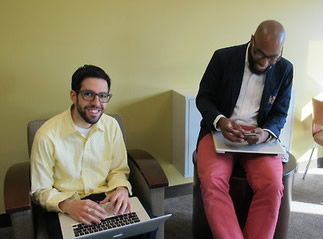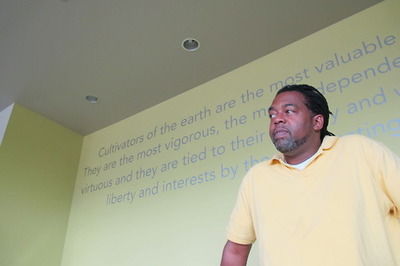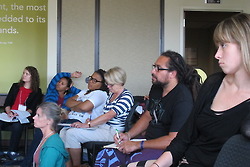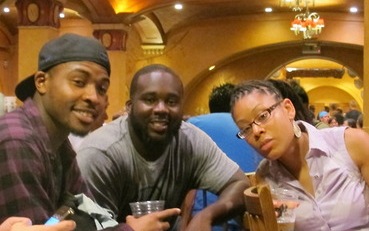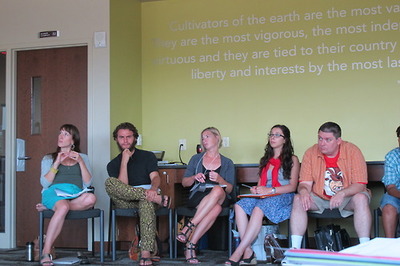a bit about "Hip Hop in the Heartland"— poetry/politics/hip hop pedagogy
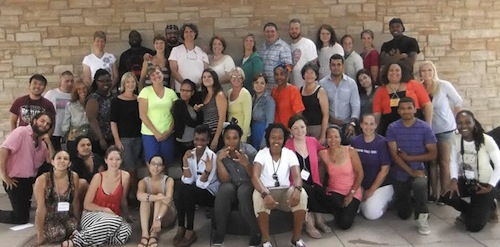
I took a week out of a busy July to attend Hip Hop in the Heartland: 7th Annual Educator and Community Leader Training Institute, expecting to observe, write about, and get a better understanding myself of the relationship between these concepts—poetry/ politics/ hip hop. Instead I found a better understanding of myself and the relationship between the personal, the political, the poetical.
What does hip hop have to do it?
If you know hip hop, I don’t have to tell you. If you’re unfamiliar with it outside of the uneasiness Tony Hoagland so brilliantly describes in his poem, “Rap Music,” put aside your preconceptions.
At its most fundamental, hip hop is culture and consciousness with origins in the art—word/ music/ movement/ visual—of poor urban youth in the Americas that has spread worldwide in 40 years, no longer particular to age, class, nation. And while during that 40 years commercial/ corporate/ media interests have laid claim and profitted from it, hip hop was born from the powerful combination of creativity, necessity, and social marginalization. Hip hop artists/ scholars sometimes distinguish between bling and righteous. While that’s a broad way to look at it, activism and social justice define the art and culture of hip hop, product and process, whether that’s more evident, as in the well-written, fact driven pieces of someone like Jasiri X, writing, witnessing, and raising consciousness about Trayvon Martin or the Tea Party or Scott Walker, or less apparent, as in the loud boom of a bass line coming from a car, as in words you can’t understand flowing rhythmically over and under the beat, as in work that emanates from rappers practicing their craft in cypher circles and perfecting it in battles.
The annual hip hop educators’ institute at the University of Wisconsin-Madison, sponsored by the Office of Multicultural Arts Initiatives (OMAI) and Urban Word in NYC, is a conference on pedagogical practice that has developed from the nexus of educational anthropology and hip hop performance, and many of its speakers are both scholar-ethnographers as well as artists of the form. It’s not simply about using hip hop texts in classrooms. It’s about learning from the culture of hip hop in order to teach/ to work more effectively and honestly with young people, as well as to create more just and effective organizations. It’s about radically transforming ourselves and our society through art, inclusiveness, conversation, racial literacy, and critical thinking around these broad issues. It’s about telling and hearing each others’ stories. It’s about investigating and unpacking values associated with certain kinds of aesthetics and language. That Madison, Wisconsin, is a center of cutting-edge thought and practice on hip hop pedagogy is amazing and an incredible asset to the local arts community.
First Wave-OMAI Assistant Creative Director Danez Smith
My essay in this feature, "swaggacity in the heart land," isn’t definitive. It’s just my own personal, meandering journey through the Institute and my own racial literacy/ experience/ writing. By the end of the week, I realized that’s all that I could offer by way of explanation or observation, and that it is a limited understanding from one middle-aged, white, non-teaching, introverted poet who has just started to learn about this art called hip hop. In the spirit of cypher, I invited all of the other participants to contribute something of their own journey: poem, photo, performance video, reflection on a workshop/the institute, lesson plan, combination of things, or anything else that came out of the week. These notes are a result, and I’m grateful to those who were able to share some of their own experience of hip hop poetry/pedagogy and its transformative effects. Props to everyone involved—students, teachers & artists, Sam Seidel for the word swaggacity, all the members of First Wave, Institute Director Michael Cirelli, Institute Coordinator Alexis Anderson-Reed, the entire Office of Multicultural Arts Initiatives at UW-Madison (OMAI), and its Executive Director Willie Ney.
—Wendy Vardaman, Madison, WI


